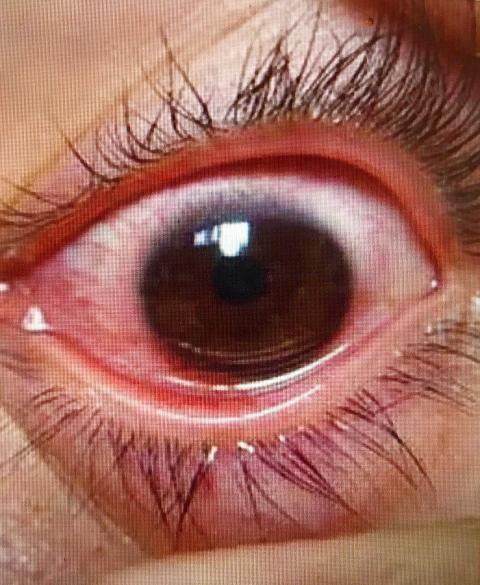An ophthalmologist on Monday warned people against using their smartphones for extended periods with screen brightness set to the highest level after a woman developed red eyes and experienced symptoms of corneal abrasion.
The 25-year-old woman, surnamed Chen (陳), in September last year sought medical help for red, teary eyes, as well as eye pain and floaters, said Hung Chi-ting (洪啟庭), an ophthalmologist at Fooyin University Hospital in Pingtung County.
An eye exam showed that her best corrected visual acuity was 0.5 and 0.6, he said.

Photo copied by Hung Chen-hung, Taipei Times
Chen said that her work as a secretary requires her to stay in touch with clients outside the office, and to see her smartphone’s screen clearly, she usually adjusted screen brightness to the highest level, or 625 lux, Hung said.
While this enabled her to see the messages on her smartphone in daylight, the combination of blue light emitted by the device and ultraviolet light from the sun bouncing off the screen increases the risk of developing cataracts and retinopathy, and could also lead to pink eye or corneal abrasion, he said.
Chen also did not lower the screen brightness after work and watched online shows on her smartphone with the lights turned off, he said.
Over time, this could result in severe inflammation of the cornea, conjunctivitis and floaters, Hung added.
Chen’s symptoms were relieved after three to four days of treatment using topical antibiotics and steroids, as well as artificial tears and other eye drops and creams, the ophthalmologist said.
To prevent similar cases, smartphone users should not keep screen brightness at the highest level all day, look at their smartphone’s screen under sunlight or view the screen in complete darkness, Hung said.
Computer and smartphone screens should be viewed from a distance of 30cm to 40cm, and the level of brightness should not exceed 500 lux, he said.

RESOLUTIONS DEBATE: Taiwan’s allies said that UN and WHA resolutions cited by China and other nations ‘do not determine Taiwan’s participation in WHO activities’ A proposal to invite Taiwan to this year’s World Health Assembly (WHA) was rejected on Monday, resulting in Taipei’s absence from the annual meeting for a ninth consecutive year, although partners spoke up for Taiwan’s participation at the first day of the meeting. The first agenda item after the opening was a “two-on-two debate” on a proposal to invite Taiwan to participate at the WHA as an observer. Similar to previous years, two countries made statements in favor of the proposal, while two others expressed their opposition. Philippine Secretary of Health Teodoro Herbosa, president of the 78th WHA, accepted the WHA General Committee’s

Palauan President Surangel Whipps Jr arrived in Taiwan last night to kick off his first visit to the country since beginning his second term earlier this year. After arriving at Taoyuan International Airport at around 6:30 pm, Whipps and his delegation were welcomed by Minister of Foreign Affairs Lin Chia-lung (林佳龍). Speaking to gathered media, the Palauan leader said he was excited and honored to be back in Taiwan on his first state visit to Taiwan since he was sworn in this January. Among those traveling with Whipps is Minister of State Gustav N. Aitaro, Public Infrastructure

Premier Cho Jung-tai (卓榮泰) on Friday laid out the Cabinet’s updated policy agenda and recapped the government’s achievements ahead of the one-year anniversary of President William Lai’s (賴清德) inauguration. Cho said the government had made progress across a range of areas, including rebuilding Hualien, cracking down on fraud, improving pedestrian safety and promoting economic growth. “I hope the public will not have the impression that the Cabinet only asked the legislature to reconsider a bunch of legal amendments,” Cho said, calling the moves “necessary” to protect constitutional governance and the public’s interest. The Cabinet would work toward achieving its “1+7” plan, he said. The

Nvidia founder and CEO Jensen Huang (黃仁勳) hosted a dinner in Taipei last night with key Taiwanese suppliers to celebrate the successful mass production of the company’s new Blackwell AI systems. Speaking to the media earlier yesterday, Huang thanked Nvidia’s Taiwanese partners for their contributions to the company’s ecosystem, while also sharing his plans to meet with Taiwan Semiconductor Manufacturing Co (TSMC) founder Morris Chang (張忠謀). In response to rumors that Nvidia will launch a downgraded Hopper H20 chip for China in July, Huang dismissed the reports, saying, “That is not true.” He clarified that there